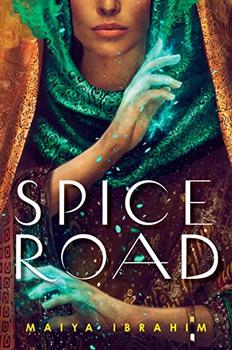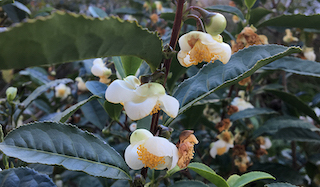Summary | Excerpt | Reviews | Beyond the Book | Read-Alikes | Genres & Themes | Author Bio

Spice Road #1
by Maiya IbrahimThis article relates to Spice Road
Spice Road, the debut novel by Maiya Ibrahim, features the Shields, a group of warriors sworn to protect the desert city of Qalia from magical beings and monsters. These warriors are gifted with magical abilities to perform their duties, but these powers only manifest when they drink misra, an ancient tea gifted to the people of Qalia. Misra tea's supernatural powers may be fictional, but scientists have discovered that tea does offer "superpowers" in the form of health benefits for the drinker.
 Not to be confused with herbal infusions, which are often labeled "tea," true tea, regardless of type, is traditionally prepared by pouring hot water over the leaves of the Camellia sinensis, or tea plant. Different preparations produce different types of tea, and herbs, fruits and other compounds may be added to provide flavor. Tea is typically categorized into one of six types: green, yellow, white, oolong, black, and dark (Pu'er); this article includes a helpful chart differentiating the types based on their level of polyphenolic oxidation. Although about two-thirds of the world population drinks tea, the most popular type of tea varies by region: Americans tend to prefer black tea, while oolong tea is popular in Southern China and green tea is the most common variety in Asia overall.
Not to be confused with herbal infusions, which are often labeled "tea," true tea, regardless of type, is traditionally prepared by pouring hot water over the leaves of the Camellia sinensis, or tea plant. Different preparations produce different types of tea, and herbs, fruits and other compounds may be added to provide flavor. Tea is typically categorized into one of six types: green, yellow, white, oolong, black, and dark (Pu'er); this article includes a helpful chart differentiating the types based on their level of polyphenolic oxidation. Although about two-thirds of the world population drinks tea, the most popular type of tea varies by region: Americans tend to prefer black tea, while oolong tea is popular in Southern China and green tea is the most common variety in Asia overall.
The earliest known writings about tea come from 3rd century CE China, describing the drink as a medicinal beverage, a claim that is supported by modern medicine. All teas contain flavonoids, a compound shown to have antioxidant properties, but the literature is divided about the clinical effectiveness of these compounds. Studies show that specific flavonoids can prevent and even kill cancer cells in mice, but only a few human studies have examined such outcomes and results are conflicting. Some scientists suggest that factors such as adding milk or honey to tea or brewing the tea for too long may reduce the antioxidant capacity of the flavonoids and thus reduce any ability to fight cancer. More research is therefore needed to determine whether tea can truly protect against cancer in humans under real-world conditions.
The effects of tea on cardiovascular health are more established: a review of 96 studies looking at 40 different health outcomes found that tea reduced the risk of cardiac death, coronary artery disease and stroke, with greater benefits conferred by drinking two to three cups per day. Three large cohort studies have produced similar findings. A 2022 study of a half million British tea drinkers found that drinking two or more cups per day correlated with decreased mortality from cardiovascular disease, ischemic heart disease and stroke. A study of approximately 77,000 Japanese tea drinkers found that green and oolong tea consumption decreased risk of death from cardiovascular disease. A similar study followed more than 80,000 Japanese men and women for an average of 13 years and showed an association between tea and a decreased risk of stroke, with the risk decreasing for each additional cup consumed per day. There's also some evidence that tea may help lower blood pressure, with regular consumption of black tea decreasing blood pressure and of green and oolong tea reducing the risk of developing hypertension. Some studies have also shown tea drinking may decrease cholesterol, although more data are needed to support this outcome.
Tea can also help those looking to stay awake. Tea naturally contains caffeine, providing drinkers with a boost of wakefulness. However, tea typically contains as little as half the amount of caffeine found in coffee, which may mean less of the jittery feeling that can come with drinking coffee. One small study showed that although consumption of coffee or tea provided similar levels of stimulation, participants slept better after having drunk tea compared with coffee, indicating that tea may be a better choice for those particularly affected by caffeine.
Although more research is needed to support some of the associations found between tea drinking and improved health, the data clearly show that tea can help the body in myriad ways.
Camellia sinensis, courtesy of Smithsonian Gardens
Filed under Medicine, Science and Tech
![]() This "beyond the book article" relates to Spice Road. It originally ran in March 2023 and has been updated for the
April 2024 paperback edition.
Go to magazine.
This "beyond the book article" relates to Spice Road. It originally ran in March 2023 and has been updated for the
April 2024 paperback edition.
Go to magazine.
Your guide toexceptional books
BookBrowse seeks out and recommends the best in contemporary fiction and nonfiction—books that not only engage and entertain but also deepen our understanding of ourselves and the world around us.